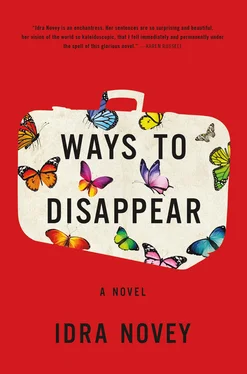Excuse me, Roberto? Flavia stuck her head in the door, her dark glasses low on her nose. Editora Record just called. They want to know if we’re going to reissue Beatriz Yagoda’s first two books, and said if we’re not they’d like to buy the rights to them. They can’t get her latest book into the stores fast enough.
Because the poor woman disappeared into a tree?
And that picture of her son.
He is quite the Adonis, isn’t he?
Rocha had known that Marcus was going to be exceptional-looking. Beatriz had known it as well, but was too modest to say such a thing about her own child. She spoke with equal modesty about her writing, and never with the air of faux modesty so many of his young writers cultivated now. With Beatriz, modesty wasn’t a performance. It was a given, a gracefulness.
Tell Record they can’t have the rights, Rocha said. In fact, tell them next Friday we’re rereleasing the books ourselves.
Next Friday? Flavia’s eyes widened behind her lenses, but Rocha didn’t pay attention. He was already considering the best approach to the new cover. He’d need something sleeker but with a deliciousness — an image of cutlery, perhaps, in silver. If he paid Eduardo extra, they could keep the printers going over the weekend and into the evenings. They could hire trucks to deliver the first copies to a few select stores to build excitement. Several years ago, he’d considered reissuing the early novels that Beatriz had published with him but had worried it would make him look desperate — out to remind everyone how relevant he’d once been — and then her last book did so poorly. She wasn’t visible anymore, or not until she disappeared.
See if Eduardo can meet this afternoon, Rocha said. No, revise that. Tell him I’ll be in his office today at three. We’ve got to race on this. Once the Comando Vermelho kidnaps their next banker, the media will move on.
There’s also this. Flavia held out a small envelope. You said you wanted to see any personal mail as soon as it came in.
Rocha slit open the envelope in one stroke, his fleshy hands moving with a new ferocity. Folded inside was a room service menu from a hotel in Salvador da Bahia. On the very bottom someone had written a single sentence — If you can’t, I understand — and signed below, S. Martins.
Eduardo at three, please, Rocha said. And Flavia, dear, why don’t you take those olives?
Whether she took them or not, he didn’t notice. “Santiago Martins” had affected his sleep. It had been so heartbreakingly Brazilian: a transvestite convinced that the only reason he dressed in women’s clothes was to stay hidden from the police. Beatriz had attended to the details with her inimitable vividness: Santiago’s dismay at how his back hair caught on the metal zipper of his dress, the assured way he maneuvered the ladle at his food cart while filling bowls with shrimp moqueca for the better-looking tourists, his gestures as feminine as those of any of the women vendors in their starched white Baiana dresses along the promenade.
Years after the police had forgotten his crimes, there was Santiago Martins — still ironing his starched white dress at night, still gossiping in the morning with the other women as they bought dendê oil and dried shrimp and predicted how brutally the sun would burn by noon.
And one night there was Santiago buying a nightgown for his mother and Santiago pulling the nightgown over his head in the privacy of his room. Santiago feeling the satin pour cool as milk down his back. Desire, Beatriz had written, was what a man will deny himself until he can’t. Rocha had convinced her to change the verb to “won’t.” He thought it was subtler, more nuanced. Beatriz hadn’t agreed, but she let him keep the change in. She knew that he loved the story but felt uneasy about publishing it. At the time, he’d been the only openly gay editor in Brazil.
Recalling the incident now, he reached for his wallet. How often did one have the chance to rewrite the hesitations of the past? He would reissue the book with Beatriz’s original choice and get it out faster than Record ever could. She’d never quite achieved as much bewildering wonder in her later books as she had in the first two she’d published with him. With this reprint, he’d put those early books on the map for good. He’d get them displayed in the front window of every Livraria Cultura in Rio and São Paulo.
First, of course, he’d have to call up the hotel in Salvador listed on the room service menu and pay for S. Martins to stay on another ten days. Once that was arranged, he’d get the new cover done, place the necessary calls to the magazines. He’d remind the country that it was Editora Eco that had launched two of the most startling new works of fiction of the last thirty years. Then, with dignity, with elegance, he’d let whoever still read literature in Rio come by and empty the office of its remaining volumes, and that would be it.
He’d put on his hat and turn off the lights.

Raquel was the only one on the floor when she headed to the elevators. Thiago had gone home to his family hours ago. He’d told her that they could look into the settlement offer from the strikers at the potash mine in the morning. She’d stayed on anyway. As long as she was in the office, she could forget about her missing mother for five, even seven minutes at a time.
On Monday nights, she’d often met her mother at the food-by-the-kilo place around the corner. Over bolinhos and marinated asparagus, Raquel would unload her latest grievance about the media and whatever mining incident they were exaggerating now.
Eventually, she’d ask about her mother’s day and her mother would talk about her persimmon trees on the balcony, smile timidly, and then bite the tip off one of the asparagus stems on her plate.
Although her mother had given evasive answers like this for years, they still made Raquel feel uneasy and untrusted. To avoid getting angry, she had come to avoid any direct questions about her mother’s writing. Chickens laid eggs. Cows and goats produced milk. Every six or seven years her mother produced a book. Of all the unreliable things about her mother, this pattern had remained unchanged. It was as true to her mother’s mysterious nature as it was of a palm to produce coconuts.
Even if she never read them, Raquel had appreciated her mother’s books for the sureness of their arrival, for proving that her mother was a functioning person, and despite the reputed darkness people found so alarming in her work, in person her mother was reassuring. All her writer friends thought they stopped by out of admiration for what she wrote, but Raquel was certain that they came more for the attentive way her mother listened to them and their pretentious ideas. Standing now outside the revolving doors of PetroXM, Raquel felt confident that her mother would return eventually and resume her life. She would come back quietly and without any apologies or solutions, but she would come back.
Buoyed by this thought, Raquel hailed a cab to Copacabana. There was no reason she couldn’t go to the cheap food-by-the-kilo spot near her mother’s anyway, and who knew? Maybe her mother would be sitting at their usual table, waiting for Raquel to find her there. She felt so relieved by this fantasy that she rolled down the window to take in the breeze. She could taste the ocean in it the way it was blowing tonight, rinsing away the stink Thiago liked to call the sweaty ass of Rio.
At the corner before the restaurant, she got out and thought of something she could text him about the strike that really couldn’t wait until tomorrow. She was punching in the words on her phone when something yanked at her neck and pulled her off the sidewalk and into a recessed doorway. It was a man’s arm, closing around her throat so fast there was no time to cry out. The man already had her crushed against him, her face to the wall, the muzzle of his gun pushing into her back.
Читать дальше













